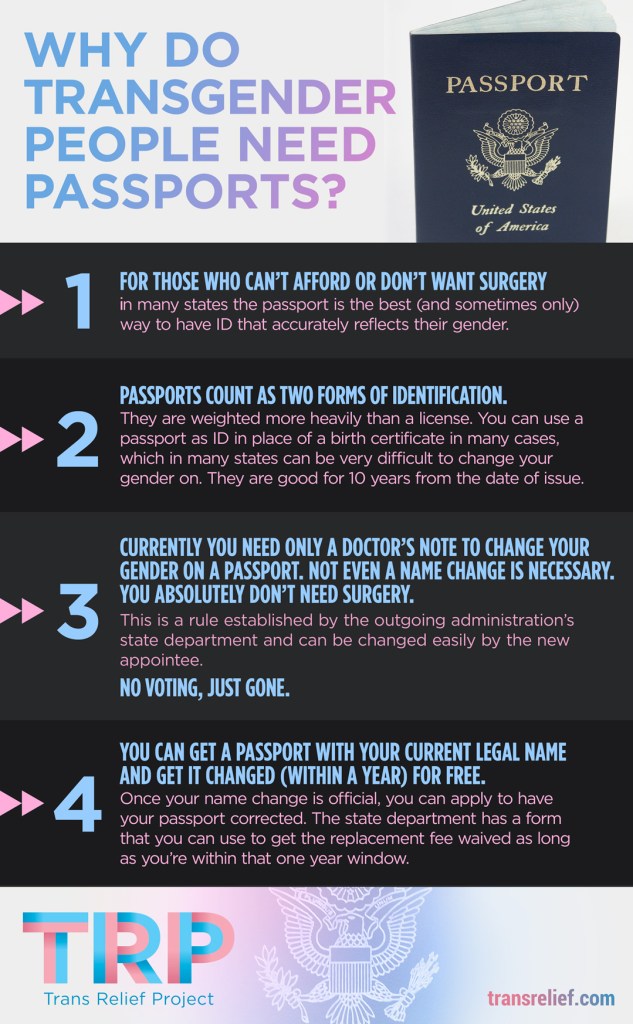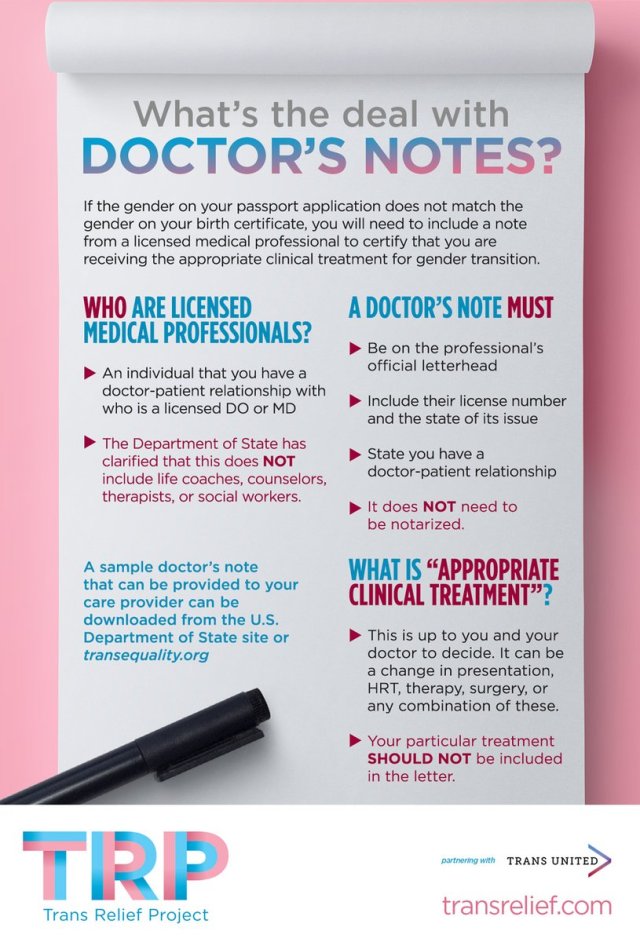We are entering such a dangerous time period for our community right now. Regardless of what your well-meaning relatives had to say this Thanksgiving, it is not an acceptable strategy for us to “wait and see” whether the hate-filled people soon to be in power actually mean the things they’ve said. They did, they do, and you and I both know it. We also know that LGBTQ women live at the intersection of multiple oppressions, and some of us are at greater risk than others. Trans women of color are particularly vulnerable to violence, and now is the time for our community to step up and do everything in our power to protect them. One avenue of support: the Trans Relief Project.
Now two weeks old, the Trans Relief Project is an organization working to help “as many trans and GNC people as possible get updated U.S. identification – passports specifically – before the regulations surrounding those rules potentially change.” After a very quick development cycle, TRP’s website now offers a resource page with helpful links for people updating their identity documents; an application for financial aid with that process; and a donation page for anyone who wants to help.
Below is an interview with the founders.
AS: Who are you? How did Trans Relief get started, and how did you choose this area as your priority to support?
TRP: We are a small group of friends and volunteers who wanted to do some good in the wake of the most recent US presidential election, the results of which we feel now threaten the rights and liberties of many Americans. One of our founders is trans, so it seemed like a natural fit to help trans and gender nonconforming people, especially considering the sheer number of scared people we’ve seen online.
What originally started as an effort to find and help 3-4 people whose passports we could personally pay for ballooned into a full-blown fundraising effort, with many more offers of help and many more requests for help than we could have imagined.
AS: Why is it so important for trans people to get passports now?
TRP: We’re placing an emphasis on passports for two reasons. First, the current administration’s policies regarding changing gender on a passport makes passports one of the best ways (and sometimes the only way, depending on the state a person lives in) they can obtain ID with the correct gender marker in their state without receiving SRS. The second reason is that we fully expect this to change as soon as the new administration has the opportunity and understanding to do so. We certainly don’t trust them to maintain one of the policies most friendly to trans people at the federal level, given their track record with women’s and LGBTQ+ rights.

AS: Do you need people’s legal names or to receive copies of any of their documentation?
TRP: At this time, all we’re asking for is an email address and a name for correspondence. It doesn’t have to be your legal name.
AS: Do you recommend getting expedited service at this point, or is normal okay?
TRP: Due to the time sensitive nature of this issue, we strongly encourage people to get their updated passports as soon as possible. If you have the money to afford it, it’s probably worth it to pay to expedite the process. No one can be sure exactly when this window will close though, so it’s hard to say.
AS: Any other tips for trans people seeking passports?
TRP: Get your documents ready. Go to the Department of State website and read up on what you have to submit. Obtain a doctor’s note from your MD or DO on their letterhead that shows their license number and the state their license is from that certifies that you’re receiving “appropriate treatment.” This can mean a number of things (not just surgery or HRT), so if you’re unsure if you’re under this umbrella, talk to your doctor about it.

AS: I saw that last week you gained sponsorship under the Trans United, a 501(c)3 organization, and also formed a relationship with the Born This Way Foundation. Can you tell me more about that? What does it mean for you and the people you’re helping?
TRP: We realized that as support for our efforts increased exponentially, it made sense to partner with a larger organization that could offer us financial and legal protection and possibly to boost our message to their audiences. Right now it’s still just our small team, however there may come a time very shortly where we may require additional volunteer assistance. Our relationship with Trans United came organically, while we were connected to the Born This Way Foundation via community organizer and activist DeRay McKesson.
AS: How many people have you helped so far?
TRP: We’ve currently helped over 100 people and have given away the entirety of the $21,000 we originally raised. We now have a form to fill out on our website in order to make the donation and distribution system easier for us (we began doing this on a case-by-case basis via emails, which was fine for helping a few people but no longer feasible once we were getting hundreds of requests).
AS: Aside from passports, what else is Trans Relief currently offering financial assistance for? What kinds of requests are outside the scope of Trans Relief?
TRP: We are currently funding passports and subsidizing some name changes (contributing towards filing and publication fees, especially), although we do have a cap to ensure donations can reach as many people as possible. Depending on the state, name changes can be expensive. We are currently not offering financial assistance for any surgical procedures, however we can offer some assistance getting the word out via social media if people are running their own crowd funding efforts. We aren’t offering to pay non-ID related legal fees, either.
AS: What’s the best way for people to get involved? If people can’t offer financial support at this time, is there anything else they can do to help?
TRP: We encourage people to help spread our message about the importance of an updated passport for people who are trans, intersex or genderqueer. We have some helpful infographics on our Twitter (@transrelief), which also host on the website. And of course, we encourage people who are concerned about the security of human rights to support other wonderful organizations (including Trans United, Born This Way Foundation, GLAAD, The Trevor Project, the ACLU, the Anti Defamation League and many others) either financially or by volunteering.
AS: Anything else you’d like to share?
TRP: People are incredibly scared right now. A lot of things about our future are uncertain. However, we want people to know that there are still helpers out there who are willing to take a stand for their rights and security. We stand united, armed with love and compassion, and even if we can only help some, it’s infinitely better than having helped no one at all.
For additional updates, visit TransRelief.com and follow @transrelief on Twitter.








Comments
Thank you for posting this! And double thanks to TransRelief!
Thank you, Laura. :)
Thank you for posting this,
I’m desperately trying to get my legal name change thru with fast speed so I can get my letter and get my passport, but my laywer is not moving at the speed I thought it would happen. I’m so scared I’m gonna be too late.
Does anyone know if I can have my doctor write the letter now with what my name will be?
Diana,
You can do your passport now in your current legal name, and then if you get your name change within a year, you can update your passport and get it re-issued for free.
The policy that’s likely to change is the one related to getting a different gender on the applicant’s passport than the one on their birth certificate, so once you get the gender marker on your passport correct, you’re good to change your name even after a potential policy change.
<3